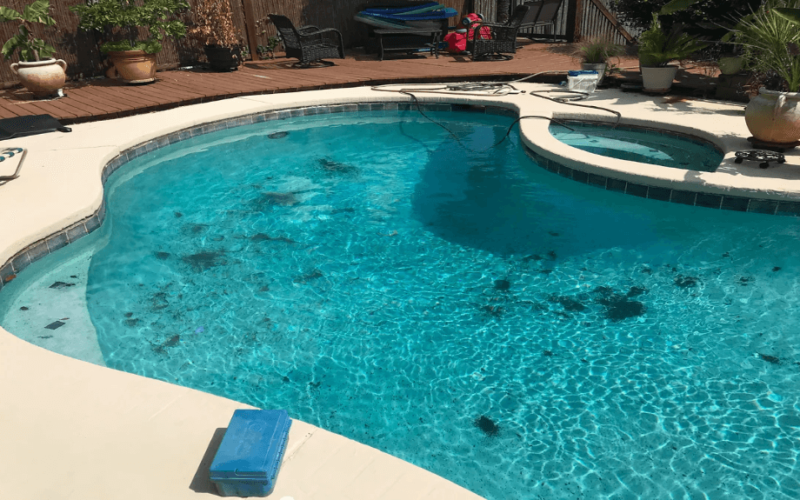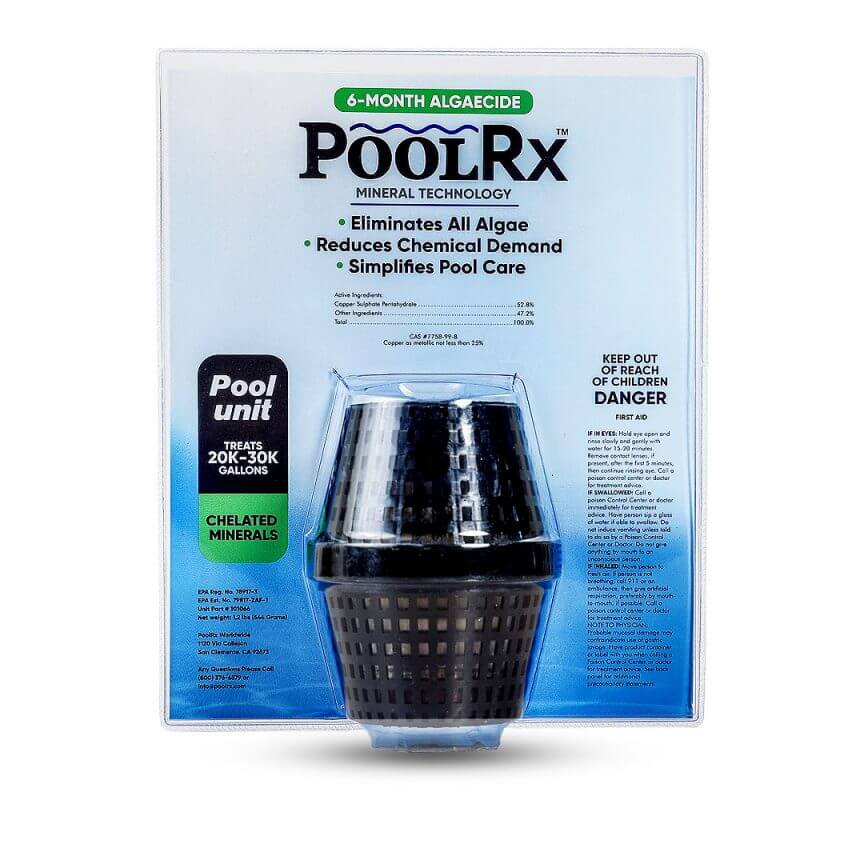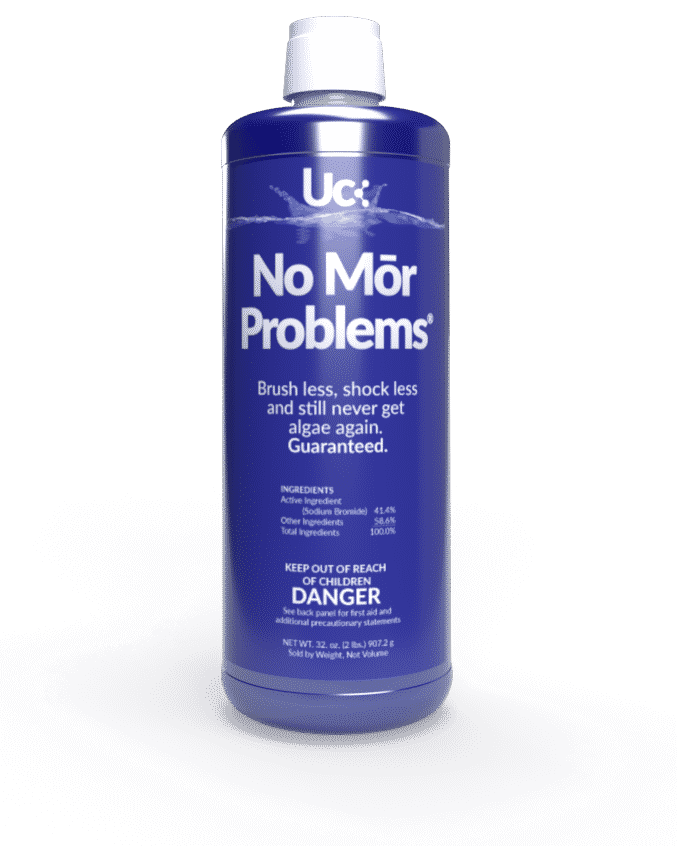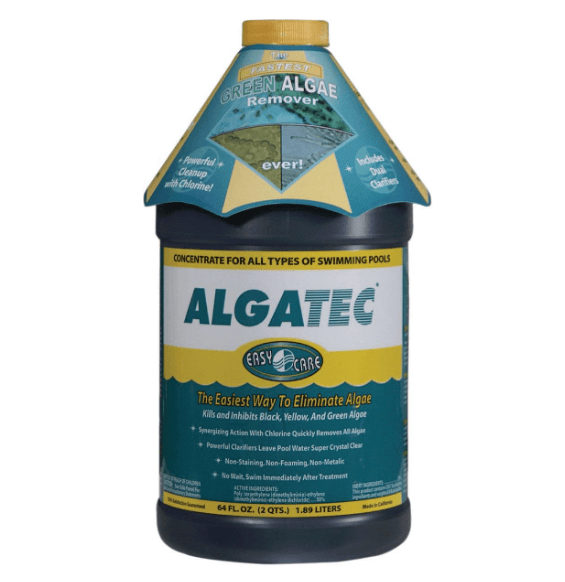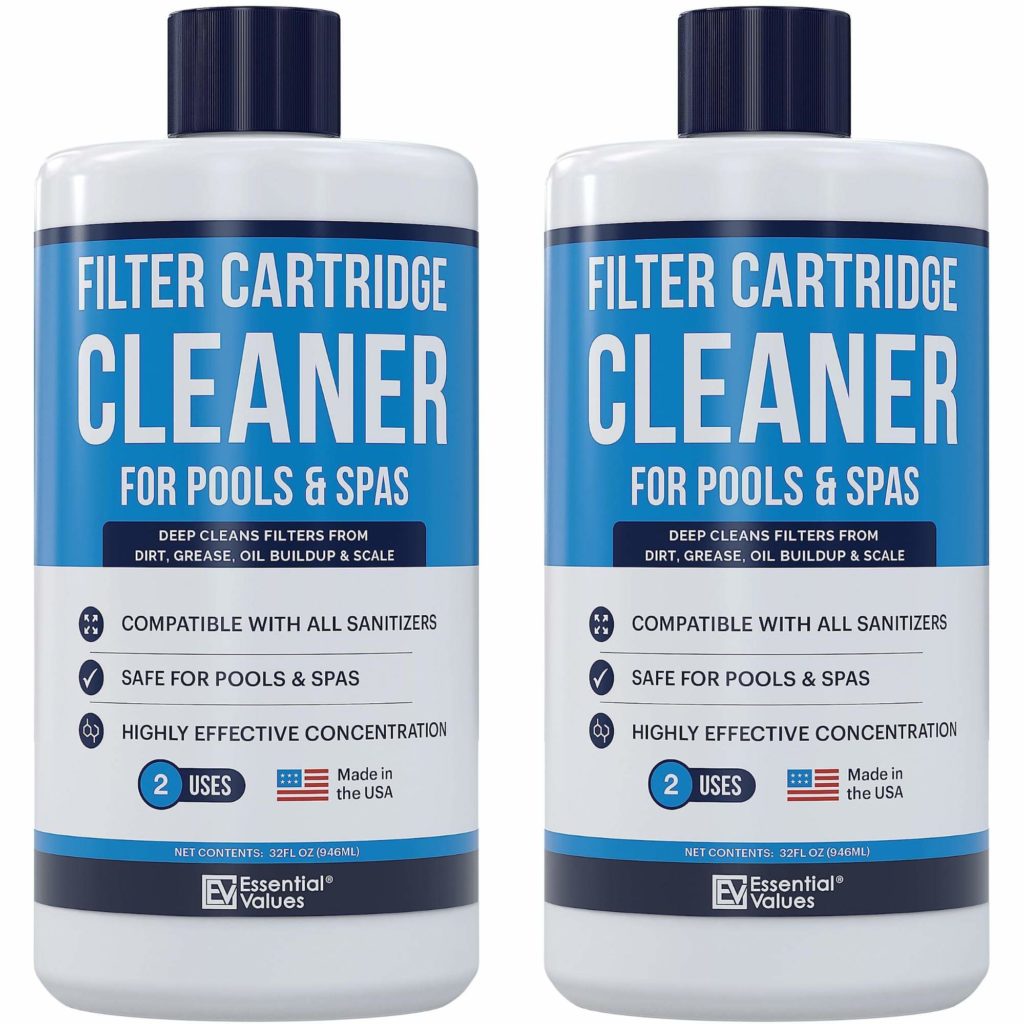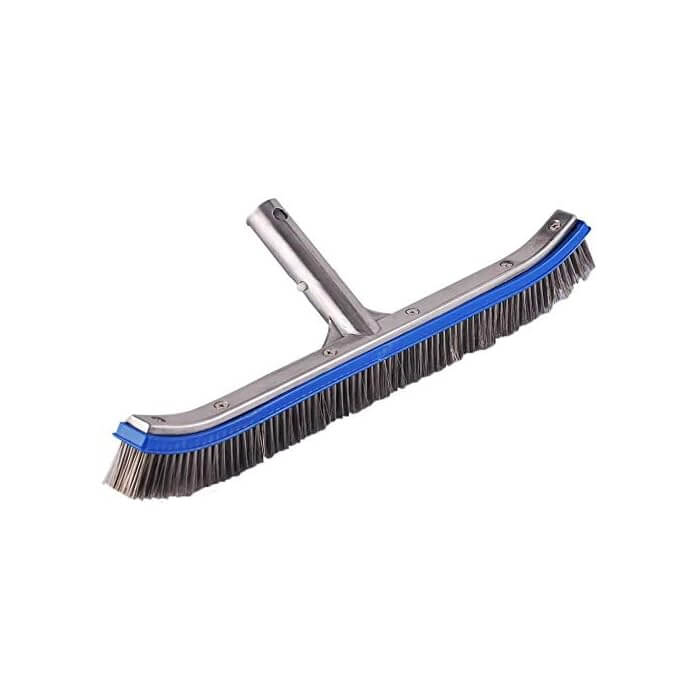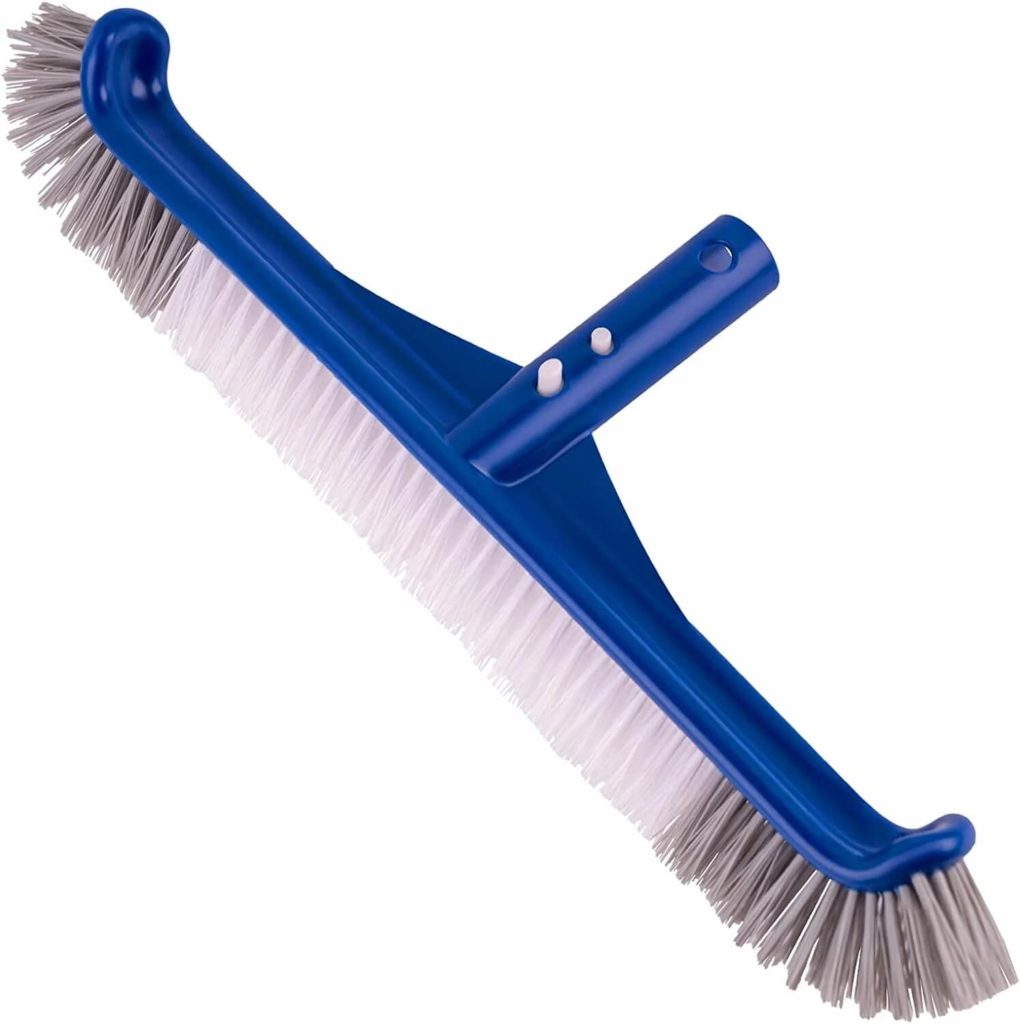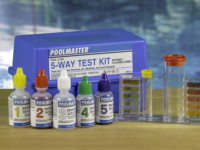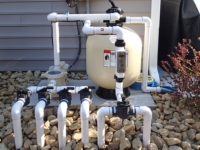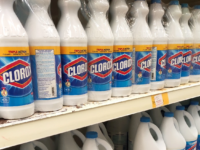Algae may not bother us in the sea, but when it shows up in your pool, it’s a red, or rather, a black flag—if you have encountered the nasty black algae. Emerging black spots don’t just ruin the poolside aesthetics, but present real health danger, and you should take action against them. This type of algae is very stubborn, and you will need to put quite a bit of effort into getting your pool back to crystal clear, but nothing is impossible.
In this article, we’ll explain what black algae in the pool means and recommend the best chemicals to deal with it. You’ll see that it is possible to solve this issue without calling the pool company if you know the right course of action. Finally, we’ll share several helpful tips on how to save time and money throughout the cleaning process. You can choose the algaecide based on the comparison table below, or explore the detailed reviews first.
Comparison Table: 3 Best Chemicals Against Black Algae
Strongest concentration of active ingredient 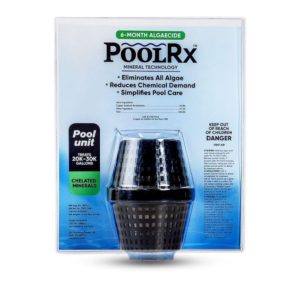 Pool RX Black Algaecide | Jump to the detailed review | |
Most sustainable chemical solution 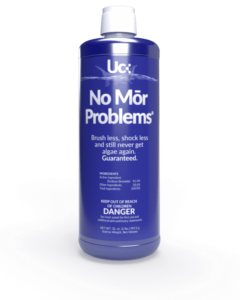 No Mor Problems Algaecide | Jump to the detailed review | |
Most versatile algaecide 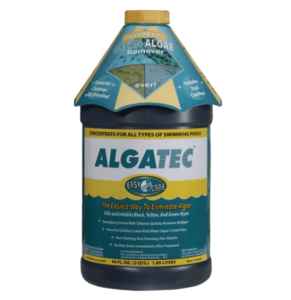 McGrayel Algatec | Jump to the detailed review | |
What Does Black Algae in a Pool Mean?
Black algae is a plant-like aquatic organism that can form dark, unsightly patches on underwater surfaces, including those in your pool. Algae are photosynthetic, meaning that they require sunlight, water, carbon dioxide, and warm temperatures to carry out their life cycle. As you can guess, all of these characteristics are present in your pool, making it a target for all types of algae, including the most frustrating black algae.
Let’s begin by understanding how the pool goes from crystal clean to covered by dark spots.
What Leads to the Black Algae Problem?
A fact that might surprise is that algae spores are always present in the pool, but they only bloom if your water chemistry goes south. Now, what factors cause black algae in the pool, exactly?
🧪 Inadequate chlorine levels create an environment for a variety of bacteria to thrive. Black algae is a bigger threat than other types of algae because of its resistance to standard chlorine levels.
🔄 Poor water circulation can lead to stagnant areas in the pool where algae flourishes. In other words, if your pump is not doing the best job—there is a significant chance of running into an algae problem.
🍂 Organic debris (most frequently—leaves) introduces nutrients into the pool, serving as a food source for black algae. Having trees near your poolside and neglecting water surface cleaning are algae risk factors.
Unfortunately, not all factors are within our control: you can’t prevent a storm from happening, and you might not always have an opportunity to perform the required (and, sometimes, complicated) pool maintenance. It is very likely that, at one point, you will have to confront black algae. And your next question might be: Is black algae in the pool harmful to humans?
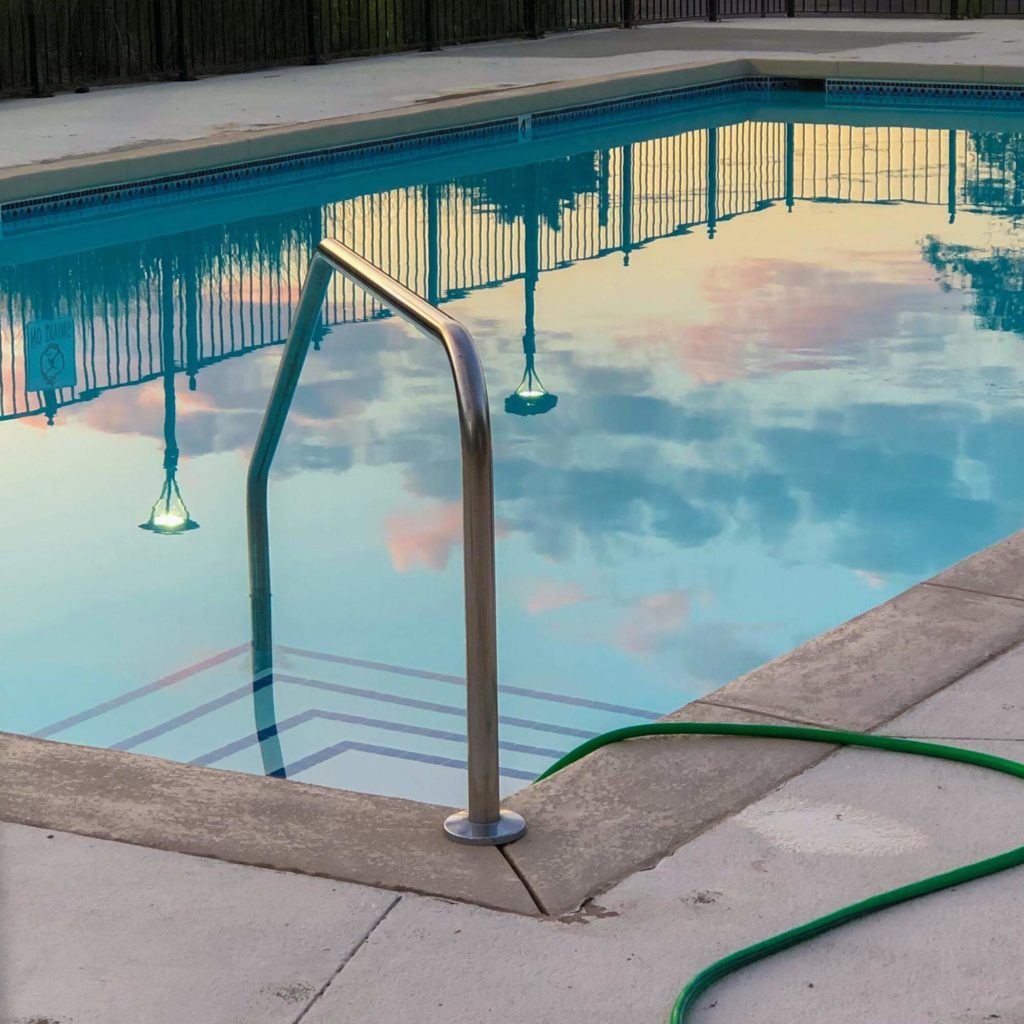
Is Black Algae in a Pool Dangerous?
While black algae is not a direct threat on its own, it creates a welcoming environment for other bacteria. This means that you might run into very unpleasant things like , , or . Also, there is a range of skin issues, including rashes, caused by the pool water when the proper chemistry is not maintained. The short answer is—don’t ignore the black algae in a pool and act right away.
Why Is It So Difficult To Get Rid Of?
Of all algae types, the black algae is the most stubborn and tends to come back after cleaning. It attaches firmly to pool surfaces, forming a root-like structure that penetrates porous materials. The slimy surface you feel when you touch the black algae spots is called mucilage, and it serves as a protective layer for the organism. This protective layer helps the algae resist the effects of standard chlorine levels and other chemical treatments.
To overcome the resilient defense of algae, you need manual work and a potent chemical solution. We took an insightful look into the most popular algaecides and studied customer experience to deduce the recipe for their success and recommend the 3 most reliable options. Also, we describe the whole process of dealing with black algae in this section.
Best Algaecides To Fight Black Algae in Detail
Pool RX Black Algaecide: Strongest Concentration of Active Ingredient
Winning category: strongest concentration of active ingredient
Pros
- The most aggressive copper-based formula to kill algae
- Very easy to use
- Acts quickly
- Remains effective for up to 6 months
- Compatible with saltwater pools
Cons
- There is a small chance of staining the pool
- Incompatible with bromine
Pool RX products are known for their distinct and successful approach to water-related issues. Most chemical solutions come in liquid form, but this one uses granular formation in a plastic cylinder that you need to place in the pump basket. Pool RX Algaecide has the strongest concentration of active ingredient (copper sulfate) available on the market, making it a solid answer to black algae in a pool. Other strong suits include the ability of this algaecide to be effective for up to 6 months and its compatibility with various pool systems, most notably saltwater pools.
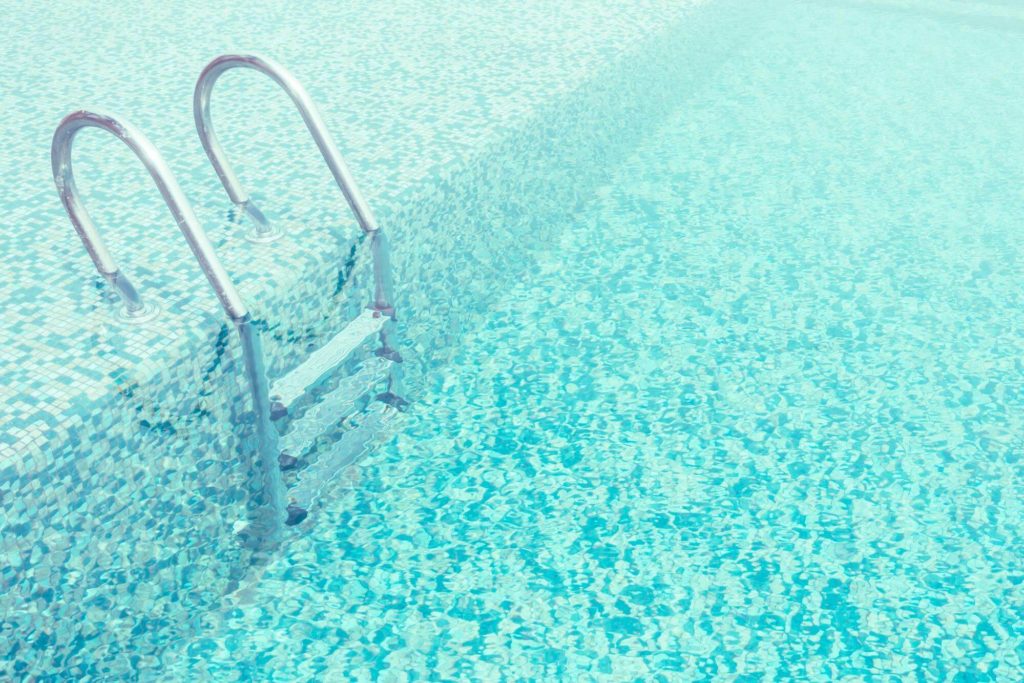
Also, Pool RX Black Algaecide is very easy to use because you are good to go right after you place it in the pool basket. Clean the basket from debris beforehand and drop the cylinder in when the pump has at least 3 hours left to run—that’s all it takes to make this little device work wonders.
We studied hundreds of clients’ reviews, and the number of complaints is insignificant compared to the amount of praise the product gets. There is one thing you need to be careful with—staining. Copper is a very potent weapon to remove black algae from the pool, but there is a chance of staining the pool surfaces and additions like pool slides.
On the upside, this problem is rare and usually occurs if you mix cleaning chemicals (which you should never do). Also, Pool RX is not compatible with bromine or biguanide sanitizers, which may become a problem if switching to chlorine is not an option for you. In this case, you can look into more versatile No Mor Problems and McGrayel Algatec algaecides.
Here’s one review from an Amazon customer for whom Pool RX Black Algaecide was a game-changer:
“I had a sudden and frustrating case of black algae in my pool. My pool guy tried to scrub it off, but it didn’t help. Then, someone on the internet recommended Pool RX, so I looked through the reviews and decided to try it. I placed it in my pump basket, and within 24 hours, the black algae was gone! My annoying problem was gone, and I couldn’t believe my eyes!”
—Gina, NC
No Mor Problems Algaecide: Most Sustainable Chemical Solution
Winning category: most sustainable chemical solution
Pros
- The most economic solution to black algae
- The best preventative and follow-up algaecide
- Safe for pool and pets
- Compatible with both chlorine and bromine
- Causes no foaming
Cons
- Struggles with heavy black algae cases
- Takes slightly longer to kill algae than other options
No Mor Problems algaecide was designed as a preventative measure to keep pool water uninhabitable for algae. But as our research shows, it is also effective at dealing with existing black algae. Unlike Pool RX, this is a liquid algaecide, which is compatible with chlorine and bromine. The chemical formula uses sodium bromide as its main active ingredient and offers the best long-term sustainability with no risk of staining. You only need 3 ounces of product for every 5,000 gallons (12 ounces for 20,000 gallons) of water in your pool for the initial treatment. It is very economical, especially compared to McGrayel Algatec, which requires at least 16 ounces of liquid to make a difference in the 20,000-gallon pool.
No Mor Problems works best against minimal to moderate cases of black algae in the pool, but if the whole surface is covered with black spots, you’ll need to use a much greater dosage, losing the chemical’s cost-effectiveness. On average, this algaecide takes a bit longer to kill the algae, as its formula is not as aggressive as the copper-based one. A potential solution is to kill the black algae with McGrayel Algatec and switch to No Mor Problems as follow-up maintenance.
This Amazon customer confirms that No Mor Problems can treat the existing black algae successfully.
“This spring, when we removed the pool cover, our water was almost black. I used No Mor Problems in the evening and woke up to see a blue pool today. It’s not crystal clear yet, but I am still thrilled, as it is still a fantastic result. Also, the algae don’t stick to the pool liner, which is nice.”
—Rose, IL
McGrayel Algatec: Most Versatile Algaecide
Winning category: most versatile algaecide
Pros
- The most versatile algaecide
- Works against all types of algae
- Compatible with all types of sanitizers and pool systems
- No risk of staining or foaming
- Can act as water clarifier
Cons
- Requires high dosage to make a difference
- Not economically viable to kill small algae spots
McGrayel Algatec is the most versatile weapon in your poolside chemistry arsenal. It uses an aggressive formula containing a patented polymeric compound and works against all types of algae. Algatec successfully deals with green, yellow, and black algae regardless of the pool surface and sanitizer type. Unlike Pool RX, this algaecide is metal-free, non-staining, and non-foaming. Moreover, its formula uses a clarifying agent, which makes the pool water ready to swim soon after application.
McGrayel Algatec is a potent and quick-action chemical that has been on the market for more than a decade. At the same time, it has a downside—a need for a generous dosage. Despite the initially lower price, you will likely spend more than you would on No Mor Problems in the long term, as you will burn through the bottle quickly. The manufacturer defines a minor black algae problem as 25% of the pool covered in spots, so if you have fewer algae, using the recommended 16 ounces for a 20,000-gallon pool will probably be an overshot.
Many customers use this algaecide as a solution to green and yellow algae, but its performance against black algae is also praised quite often. Here’s an Amazon customer’s feedback on his struggle with black algae.
“Black algae got into my pool after a hurricane, and it was particularly stubborn. I tried scrubbing and shocking, but it never helped. After reading the reviews, I bought a bottle of Algatec, followed the instructions, and after 5 days, the nasty black algae disappeared. This thing is a wise investment, especially for the Floridian weather.”
—Joe, FL
Unfortunately, choosing an effective algaecide is only halfway to success. In the next section, we’ll explore every detail you need to know about how to get rid of black algae in a pool.
How the Cleaning Process Looks Like
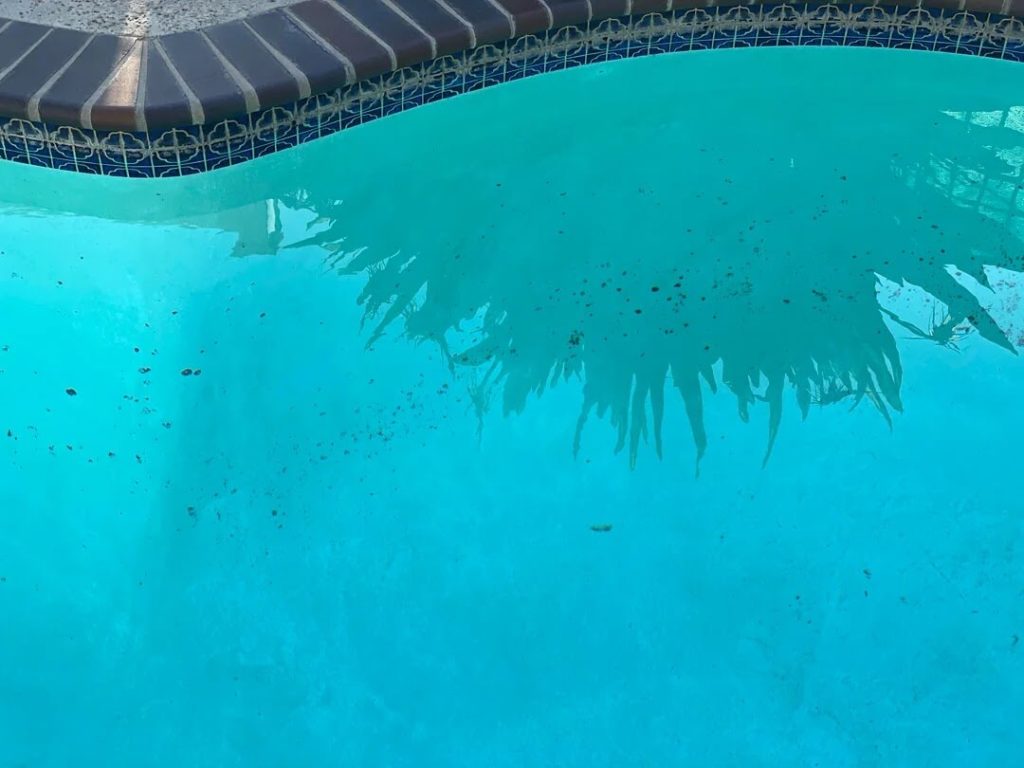
A photo of black algae in the pool—the pool owner needs to scrub these spots as fast as possible
Removing black algae from the pool is tedious because it requires lots of scrubbing, regardless of the chemicals you intend to use. Here is a step-by-step guide on how to complete the black algae cleaning process:
- Cleaning the filter is the first step of the maintenance. Usually, you’ll see lots of organic debris in your filter basket that can be removed manually. However, if you want to be on the safer side, you can use the special filter cleaner.
- Adjusting water chemistry is essential because proper pH, alkalinity, and chlorine levels directly influence the effectiveness of any algaecide. You learn more about these chemical metrics and ways to adjust them in our related articles.
- Brushing the pool surface is not the easiest task. But if you want to make sure that algaecide will do its job, you need to put effort into scrubbing the black algae spots. As we mentioned earlier, black algae is hard to kill because of its protective layers, and damaging them with a stainless steel brush (or a nylon one, if you have a fiberglass or vinyl surface) will make it easier for algaecide to kill the algae.
- Applying the sanitizer next to the affected areas will also help weaken black algae. Keep in mind that Pool RX is not compatible with bromine, and McGrayel Algatec is very effective with chlorine.
- Applying the algaecide that fits your pool system should now do the heavy lifting. Don’t forget to make sure that you follow the instructions on the packaging!
- Run the pump to disperse the chemicals and maximize the cleaning effect.
- Keep scrubbing and sanitizing for 7–10 days until the black algae is completely gone.
As you can see, killing black algae in the pool takes effort, but a successful outcome is achievable if you know the right course of action and have powerful tools at your disposal. Now, you know the fundamentals, but there is also an expert level of pool cleaning, and this advice might save you money and effort.
Expert Tips To Maximize the Effectiveness of Cleaning
🛡️ Wear protective gear
Chlorine shock treatments and algaecides involve handling chemical substances that can be harsh on the skin and eyes. Protective gear, including gloves, masks, and goggles, ensures the safety of the person dealing with black algae.
🌙 Apply sanitizer at night
While it’s not mandatory, applying sanitizer in the evening can help maximize its effectiveness by preventing rapid chlorine degradation, especially if you live in a region with intense sunlight.
🧹 Sanitize the cleaning equipment
You will use the same brush later and bring the black algae you scrubbed back into the pool. Just put the cleaning equipment in shallow water after adding all the needed chemicals to avoid it.
🧼 Scrub the black algae spots with chlorine tablets
You can break the chlorine tablet in two and scrub the algae spot with the rough side. In such a way, you’ll damage the black algae protective layer and make your algaecide more effective.
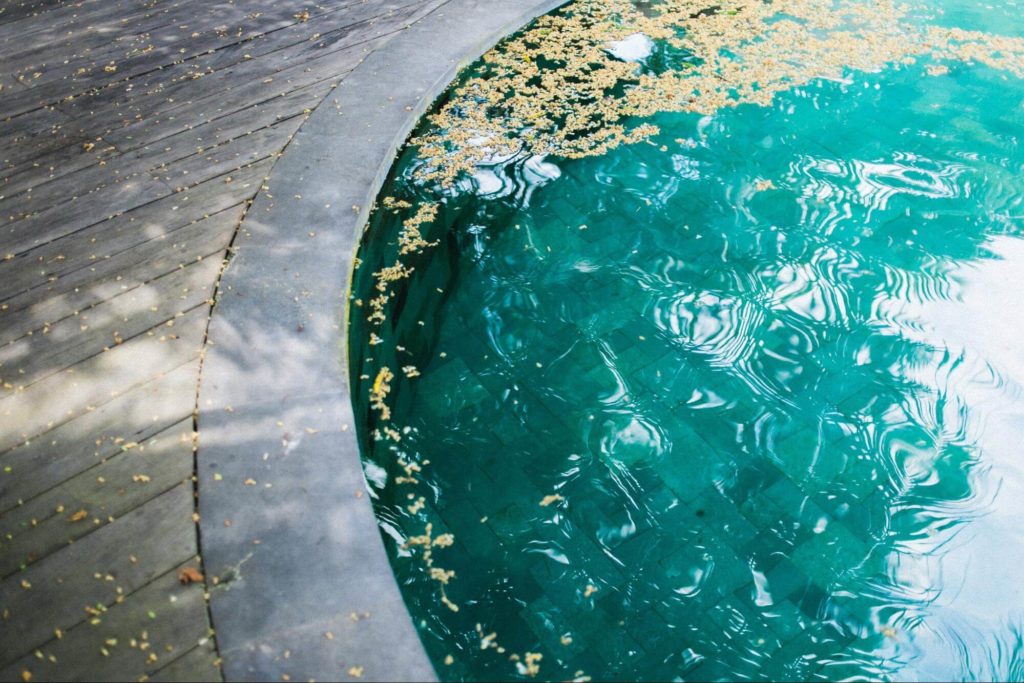
Summary
Black algae is a stubborn issue that often drives pool owners desperate. In this article, we explained what causes black algae in a pool and how to deal with it. One part of your success is the potent algaecide, and we reviewed 3 best options in detail. The second part is the proper cleaning process, which includes lots of manual work. We also prepared 4 expert tips on how to get rid of black algae in the pool—these might save a few dollars.
We hope our research proves helpful and that black algae won’t stay at your poolside for too long. Thanks for reading!
FAQ
💪 What Is the Best Algaecide for Black Algae?
We chose 3 algaecides with the best record against black algae in the pool. Each of them uses a different formula and has their advantages and drawbacks. Check out our detailed reviews or look through the comparison table to know more.
🤢 Is Black Algae Harmful To Swim In?
While black algae doesn’t hurt you directly, it creates an environment for other pathogens like cryptosporidium, E. coli, or giardia to flourish. In short, it is not a good idea to swim in such water.
🤔 How Do You Get Rid of Black Algae in a Pool?
Removing black algae from your pool takes a potent algaecide and proper cleaning process. Both parts of this equation are equally important.
♾️ How Do I Get Rid of Black Algae Permanently?
Black algae tend to come back and to avoid it, you can use preventative algaecide like this one and follow tips from this section.
